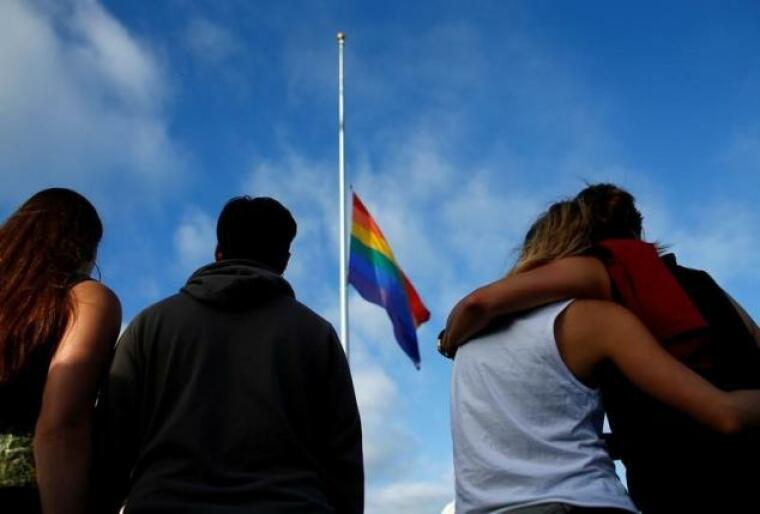LGBT Muslims ostracized following Orlando shooting tragedy
Gay Muslims fear backlash in the aftermath of the Orlando nightclub shooting that happened Sunday, June 12 at the height of Islamaphobia and anti-LGBT sentiments.
Sunday's tragedy is not just the worst mass shooting in the U.S. history but also the worst attack against the lesbian, gay, bisexual, and transgender (LGBT) community in America, according to Reuters.

After an Afghan-American gunman with Islamic State sympathy attacked the Pulse gay nightclub and killed 49 and injured 53, several Muslim groups quickly denounced the attack and expressed solidarity with the LGBT community. On the other hand, politicians like Republican presidential candidate Donald Trump responded by blaming the Muslims for not reporting the gunman and reiterating his proposal to ban Muslim immigrants.
"When I heard about the shootings, the first thing I thought was, please don't let it be a Muslim," Amina Abdul Jalil, a gay Muslim, said Tuesday during a vigil in Atlanta for the Orlando victims, as reported by NBC News.
Los Angeles Times quoted the rising cases of hate crimes exposing Muslim bigotry in the country as a result of Islamic terroristic attacks. Hate crimes against American Muslims rose to 481 cases in 2015 from 154 the previous year.
Orlando's mass shooting tragedy also highlighted the Islamic faith's denunciation of homosexuality.
Representative for Muslim Alliance for Sexual and Gender Diversity, Tynan Powell, told Reuters, "There are Muslims who believe that the Koran forbids homosexuality, just as there are Christians who believe the Bible does."
A study made by Pew Research Center in 2015, as reported by the Associated Press, indicates 42 percent Muslims living in the U.S. support same-sex marriages while Christians rated a bit higher at 44 percent, Mormons at 40 percent, and Evangelicals the lowest at 28 percent.
One gay Muslim man originating from Afghanistan, who has requested to remain anonymous, recalled he was told off during a vigil for Orlando victims at University of Minnesota on Tuesday, "This is not the right time or place for you."
"Even my grieving was questioned because of my identity," he said.
Mona Siam, a lesbian Muslim who left her country Jordan to find freedom in America, also said she feels that every part of her identity is being attacked.
In light of all these, 50 LGBTQ groups on Monday espoused for unity instead of anti-Muslim rhetoric.
They stated, "We know what it looks like and feels like to be scapegoated and isolated in the midst of a crisis."
 Christians don't have to affirm transgenderism, but they can’t express that view at work: tribunal
Christians don't have to affirm transgenderism, but they can’t express that view at work: tribunal Archaeology discovery: Medieval Christian prayer beads found on Holy Island
Archaeology discovery: Medieval Christian prayer beads found on Holy Island Presbyterian Church in America votes to leave National Association of Evangelicals
Presbyterian Church in America votes to leave National Association of Evangelicals Over 50 killed in 'vile and satanic' attack at Nigerian church on Pentecost Sunday
Over 50 killed in 'vile and satanic' attack at Nigerian church on Pentecost Sunday Ukrainian Orthodox Church severs ties with Moscow over Patriarch Kirill's support for Putin's war
Ukrainian Orthodox Church severs ties with Moscow over Patriarch Kirill's support for Putin's war Islamic State kills 20 Nigerian Christians as revenge for US airstrike
Islamic State kills 20 Nigerian Christians as revenge for US airstrike Man who served 33 years in prison for murder leads inmates to Christ
Man who served 33 years in prison for murder leads inmates to Christ


 Nigerian student beaten to death, body burned over ‘blasphemous’ WhatsApp message
Nigerian student beaten to death, body burned over ‘blasphemous’ WhatsApp message 'A new low': World reacts after Hong Kong arrests 90-year-old Cardinal Joseph Zen
'A new low': World reacts after Hong Kong arrests 90-year-old Cardinal Joseph Zen Iran sentences Christian man to 10 years in prison for hosting house church worship gathering
Iran sentences Christian man to 10 years in prison for hosting house church worship gathering French Guyana: Pastor shot dead, church set on fire after meeting delegation of Evangelicals
French Guyana: Pastor shot dead, church set on fire after meeting delegation of Evangelicals ‘Talking Jesus’ report finds only 6% of UK adults identify as practicing Christians
‘Talking Jesus’ report finds only 6% of UK adults identify as practicing Christians Mission Eurasia ministry center blown up in Ukraine, hundreds of Bibles destroyed: 'God will provide'
Mission Eurasia ministry center blown up in Ukraine, hundreds of Bibles destroyed: 'God will provide' Church holds service for first time after ISIS desecrated it 8 years ago
Church holds service for first time after ISIS desecrated it 8 years ago Burger King apologizes for 'offensive campaign' using Jesus' words at the Last Supper
Burger King apologizes for 'offensive campaign' using Jesus' words at the Last Supper Uganda: Muslims abduct teacher, burn him inside mosque for praying in Christ’s name
Uganda: Muslims abduct teacher, burn him inside mosque for praying in Christ’s name